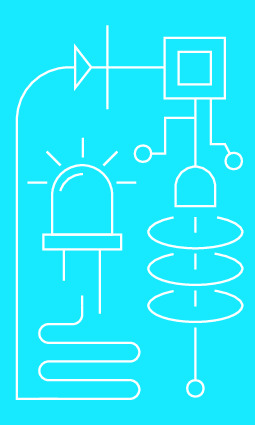|
|
|
| Module code: E2906 |
|
|
2V+1U+1P (4 hours per week) |
|
5 |
| Semester: 2 |
| Mandatory course: yes |
Language of instruction:
German |
Assessment:
Written exam, practical examination mit composition (3 lab experiments, no grade)
[updated 25.05.2021]
|
E2906 (P211-0143, P211-0144) Electrical Engineering and Information Technology, Master, ASPO 01.04.2019
, semester 2, mandatory course, technical
|
60 class hours (= 45 clock hours) over a 15-week period.
The total student study time is 150 hours (equivalent to 5 ECTS credits).
There are therefore 105 hours available for class preparation and follow-up work and exam preparation.
|
Recommended prerequisites (modules):
E2801
E2803
[updated 11.10.2023]
|
Recommended as prerequisite for:
|
Module coordinator:
Prof. Dr. Marc Klemm |
Lecturer: Prof. Dr. Marc Klemm
[updated 10.09.2018]
|
Learning outcomes:
After successfully completing this module, students will have both the mathematical-physical, as well as the technical knowledge to carry out application-oriented scientific work in the field of high and extra-high voltage technology, as well as diagnostics. This pertains to the following in particular, AC, DC and impulse voltages above 100kV, PD measurement and diagnostics, as well as lightning/surge protection and insulation coordination. Students will be able to compare and apply different field calculation methods, design and conduct experiments, and evaluate more complex results. Through lab work, students will be competent in team building and teamwork, as well as the organization of processes in a scientific laboratory environment.
[updated 25.05.2021]
|
Module content:
1. Field calculation methods:
Superposition method; imagecharge method; boundary element method; confromal imaging; difference method; finite elements; Schwaiger’s utilization factor
2.
Field control:
Optimization, stratification, cap. control
3. Electric strength:
Statistical basics; breakdown behavior with large impact distances and PD; vacuum switching technology; ignition delay; impulse voltage
4. Overvoltage:
Formation (especially thunderstorms), propagation (especially travelling waves) and protection against overvoltages
5. Insulation coordination
6. High-voltage measurement and high-voltage testing technology
In particular, partial discharge test engineering & diagnosis, impulse voltage measurement engineering, opt. methods
[updated 25.05.2021]
|
Teaching methods/Media:
Lecture with practical lab components; blackboard, overhead transparencies, presentations
[updated 25.05.2021]
|
Recommended or required reading:
Beyer, Manfred; Zaengl, Walter; Boeck, Wolfram; Möller, Klaus: Hochspannungstechnik, Springer, 1986
Böhme, Helmut: Mittelspannungstechnik, Verlag Technik, Berlin, 2005, 2. Aufl.
Hilgarth, Günther: Hochspannungstechnik, Teubner, 1997, 3. Aufl.
Küchler, Andreas: Hochspannungstechnik, Springer, (akt. Aufl.)
Sirotinski, L.J.: Hochspannungstechnik, Band 1 & 2, VEB Verlag Technik, Berlin
[updated 25.05.2021]
|


